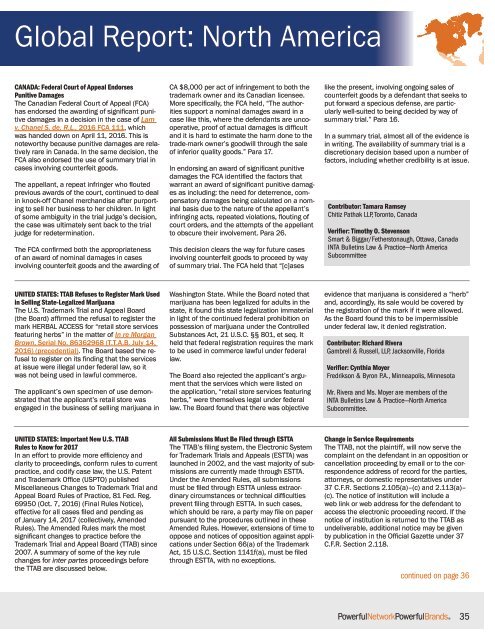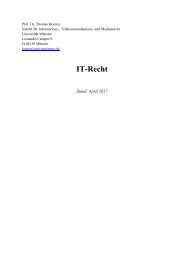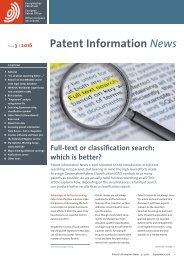GlobalReport
QqMg309yB9H
QqMg309yB9H
You also want an ePaper? Increase the reach of your titles
YUMPU automatically turns print PDFs into web optimized ePapers that Google loves.
Global Report: North America<br />
CANADA: Federal Court of Appeal Endorses<br />
Punitive Damages<br />
The Canadian Federal Court of Appeal (FCA)<br />
has endorsed the awarding of significant punitive<br />
damages in a decision in the case of Lam<br />
v. Chanel S. de. R.L., 2016 FCA 111, which<br />
was handed down on April 11, 2016. This is<br />
noteworthy because punitive damages are relatively<br />
rare in Canada. In the same decision, the<br />
FCA also endorsed the use of summary trial in<br />
cases involving counterfeit goods.<br />
The appellant, a repeat infringer who flouted<br />
previous awards of the court, continued to deal<br />
in knock-off Chanel merchandise after purporting<br />
to sell her business to her children. In light<br />
of some ambiguity in the trial judge’s decision,<br />
the case was ultimately sent back to the trial<br />
judge for redetermination.<br />
The FCA confirmed both the appropriateness<br />
of an award of nominal damages in cases<br />
involving counterfeit goods and the awarding of<br />
CA $8,000 per act of infringement to both the<br />
trademark owner and its Canadian licensee.<br />
More specifically, the FCA held, “The authorities<br />
support a nominal damages award in a<br />
case like this, where the defendants are uncooperative,<br />
proof of actual damages is difficult<br />
and it is hard to estimate the harm done to the<br />
trade-mark owner’s goodwill through the sale<br />
of inferior quality goods.” Para 17.<br />
In endorsing an award of significant punitive<br />
damages the FCA identified the factors that<br />
warrant an award of significant punitive damages<br />
as including: the need for deterrence, compensatory<br />
damages being calculated on a nominal<br />
basis due to the nature of the appellant’s<br />
infringing acts, repeated violations, flouting of<br />
court orders, and the attempts of the appellant<br />
to obscure their involvement. Para 26.<br />
This decision clears the way for future cases<br />
involving counterfeit goods to proceed by way<br />
of summary trial. The FCA held that “[c]ases<br />
like the present, involving ongoing sales of<br />
counterfeit goods by a defendant that seeks to<br />
put forward a specious defense, are particularly<br />
well-suited to being decided by way of<br />
summary trial.” Para 16.<br />
In a summary trial, almost all of the evidence is<br />
in writing. The availability of summary trial is a<br />
discretionary decision based upon a number of<br />
factors, including whether credibility is at issue.<br />
Contributor: Tamara Ramsey<br />
Chitiz Pathak LLP, Toronto, Canada<br />
Verifier: Timothy O. Stevenson<br />
Smart & Biggar/Fetherstonaugh, Ottawa, Canada<br />
INTA Bulletins Law & Practice—North America<br />
Subcommittee<br />
UNITED STATES: TTAB Refuses to Register Mark Used<br />
in Selling State-Legalized Marijuana<br />
The U.S. Trademark Trial and Appeal Board<br />
(the Board) affirmed the refusal to register the<br />
mark HERBAL ACCESS for “retail store services<br />
featuring herbs” in the matter of In re Morgan<br />
Brown, Serial No. 86362968 (T.T.A.B. July 14,<br />
2016) (precedential). The Board based the refusal<br />
to register on its finding that the services<br />
at issue were illegal under federal law, so it<br />
was not being used in lawful commerce.<br />
The applicant’s own specimen of use demonstrated<br />
that the applicant’s retail store was<br />
engaged in the business of selling marijuana in<br />
Washington State. While the Board noted that<br />
marijuana has been legalized for adults in the<br />
state, it found this state legalization immaterial<br />
in light of the continued federal prohibition on<br />
possession of marijuana under the Controlled<br />
Substances Act, 21 U.S.C. §§ 801, et seq. It<br />
held that federal registration requires the mark<br />
to be used in commerce lawful under federal<br />
law.<br />
The Board also rejected the applicant’s argument<br />
that the services which were listed on<br />
the application, “retail store services featuring<br />
herbs,” were themselves legal under federal<br />
law. The Board found that there was objective<br />
evidence that marijuana is considered a “herb”<br />
and, accordingly, its sale would be covered by<br />
the registration of the mark if it were allowed.<br />
As the Board found this to be impermissible<br />
under federal law, it denied registration.<br />
Contributor: Richard Rivera<br />
Gambrell & Russell, LLP, Jacksonville, Florida<br />
Verifier: Cynthia Moyer<br />
Fredrikson & Byron P.A., Minneapolis, Minnesota<br />
Mr. Rivera and Ms. Moyer are members of the<br />
INTA Bulletins Law & Practice—North America<br />
Subcommittee.<br />
UNITED STATES: Important New U.S. TTAB<br />
Rules to Know for 2017<br />
In an effort to provide more efficiency and<br />
clarity to proceedings, conform rules to current<br />
practice, and codify case law, the U.S. Patent<br />
and Trademark Office (USPTO) published<br />
Miscellaneous Changes to Trademark Trial and<br />
Appeal Board Rules of Practice, 81 Fed. Reg.<br />
69950 (Oct. 7, 2016) (Final Rules Notice),<br />
effective for all cases filed and pending as<br />
of January 14, 2017 (collectively, Amended<br />
Rules). The Amended Rules mark the most<br />
significant changes to practice before the<br />
Trademark Trial and Appeal Board (TTAB) since<br />
2007. A summary of some of the key rule<br />
changes for inter partes proceedings before<br />
the TTAB are discussed below.<br />
All Submissions Must Be Filed through ESTTA<br />
The TTAB’s filing system, the Electronic System<br />
for Trademark Trials and Appeals (ESTTA) was<br />
launched in 2002, and the vast majority of submissions<br />
are currently made through ESTTA.<br />
Under the Amended Rules, all submissions<br />
must be filed through ESTTA unless extraordinary<br />
circumstances or technical difficulties<br />
prevent filing through ESTTA. In such cases,<br />
which should be rare, a party may file on paper<br />
pursuant to the procedures outlined in these<br />
Amended Rules. However, extensions of time to<br />
oppose and notices of opposition against applications<br />
under Section 66(a) of the Trademark<br />
Act, 15 U.S.C. Section 1141f(a), must be filed<br />
through ESTTA, with no exceptions.<br />
Change in Service Requirements<br />
The TTAB, not the plaintiff, will now serve the<br />
complaint on the defendant in an opposition or<br />
cancellation proceeding by email or to the correspondence<br />
address of record for the parties,<br />
attorneys, or domestic representatives under<br />
37 C.F.R. Sections 2.105(a)–(c) and 2.113(a)–<br />
(c). The notice of institution will include a<br />
web link or web address for the defendant to<br />
access the electronic proceeding record. If the<br />
notice of institution is returned to the TTAB as<br />
undeliverable, additional notice may be given<br />
by publication in the Official Gazette under 37<br />
C.F.R. Section 2.118.<br />
continued on page 36<br />
35





